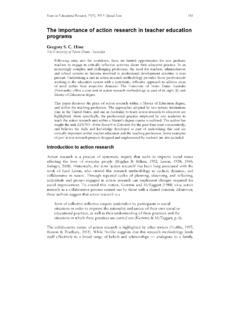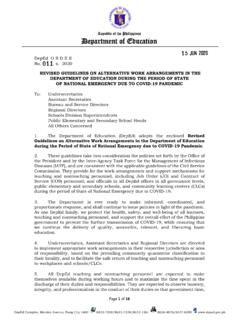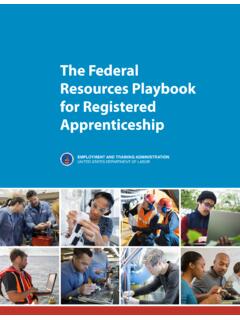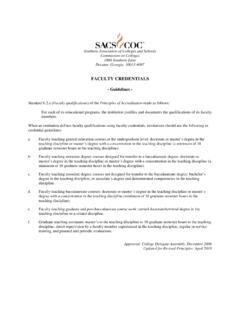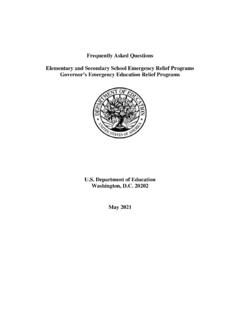Transcription of The importance of action research in teacher education ...
1 Issues in Educational research , 23(2), 2013: Special Issue 151 The importance of action research in teacher education programs Gregory S. C. Hine The University of Notre Dame Australia Following entry into the workforce , there are limited opportunities for new graduate teachers to engage in critically reflective activities about their educative practice. In an increasingly complex and challenging profession, the need for teachers, administrators and school systems to become involved in professional development activities is ever present. Undertaking a unit in action research methodology provides those professionals working in the education system with a systematic, reflective approach to address areas of need within their respective domains. The University of Notre Dame Australia (Fremantle) offers a core unit in action research methodology as part of its eight (8) unit Master of education degree. This paper discusses the place of action research within a Master of education degree, and within the teaching profession.
2 The approaches adopted by two tertiary institutions (one in the United States, and one in Australia) to teach action research to educators are highlighted. More specifically, the professional practice employed by one academic to teach the action research unit within a Master s degree course is outlined. The author has taught the unit ED6765: action research in education for the past four years consecutively, and believes the skills and knowledge developed as part of undertaking this unit are critically important within teacher education and the teaching profession. Some examples of past action research projects designed and implemented by students are also included. Introduction to action research action research is a process of systematic inquiry that seeks to improve social issues affecting the lives of everyday people (Bogdan & Bilken, 1992; Lewin, 1938; 1946; Stringer, 2008). Historically, the term action research has been long associated with the work of Kurt Lewin, who viewed this research methodology as cyclical, dynamic, and collaborative in nature.
3 Through repeated cycles of planning, observing, and reflecting, individuals and groups engaged in action research can implement changes required for social improvement. To extend this notion, Kemmis and McTaggart (1988) view action research as a collaborative process carried out by those with a shared concern. Moreover, these authors suggest that action research is a form of collective reflective enquiry undertaken by participants in social situations in order to improve the rationality and justice of their own social or educational practices, as well as their understanding of these practices and the situations in which these practices are carried out (Kemmis & McTaggart, p. 6). The collaborative nature of action research is highlighted by other writers (Noffke, 1997; Reason & Bradbury, 2011). While Noffke suggests that this research methodology lends itself effectively to a broad range of beliefs and relationships analogous to a family, 152 The importance of action research in teacher education programs Reason and Bradbury postulate that collaborative efforts help develop practical ideas to assist with the pursuit of worthwhile human purposes.
4 Specifically, they contend that the participatory, democratic process of action research seeks to bring together action and reflection, theory and practice, in participation with others, in the pursuit of practical solutions to issues of pressing concern to people, and more generally the flourishing of individual persons and their communities (Reason & Bradbury, pp. 9-10). Broadly speaking, action research enables researchers to develop a systematic, inquiring approach toward their own practices (Frabutt et al., 2008) oriented towards effecting positive change in this practice (Holter & Frabutt, 2012), or within a broader community (Mills, 2011). action research in education action research is an attractive option for teacher researchers, school administrative staff, and other stakeholders in the teaching and learning environment to consider (Mills, 2011). Specifically, action research in education can be defined as the process of studying a school situation to understand and improve the quality of the educative process (Hensen, 1996; Johnson, 2012; McTaggart, 1997).
5 It provides practitioners with new knowledge and understanding about how to improve educational practices or resolve significant problems in classrooms and schools (Mills, 2011; Stringer, 2008). action research uses a systematic process (Dinkelman, 1997; McNiff, Lomax, & Whitehead, 1996), is participatory in nature (Holter & Frabutt, 2012), and offers multiple, beneficial opportunities for those professionals working within the teaching profession (Johnson, 2012; McTaggart, 1997; Schmuck, 1997). These opportunities include facilitating the professional development of educators (Barone et al., 1996), increasing teacher empowerment (Book, 1996; Fueyo & Koorland, 1997; Hensen, 1996), and bridging the gap between research and practice (Johnson, 2012; Mills, 2011). These opportunities will be explored below. Within education , the main goal of action research is to determine ways to enhance the lives of children (Mills, 2011).
6 At the same time, action research can enhance the lives of those professionals who work within educational systems. To illustrate, action research has been directly linked to the professional growth and development of teachers (Hensen, 1996; Osterman & Kottkamp, 1993; Tomlinson, 1995). According to Hensen, action research (a) helps teachers develop new knowledge directly related to their classrooms, (b) promotes reflective teaching and thinking, (c) expands teachers pedagogical repertoire, (d) puts teachers in charge of their craft, (e) reinforces the link between practice and student achievement, (f) fosters an openness toward new ideas and learning new things, and (g) gives teachers ownership of effective practices. Moreover, action research workshops can be used to replace traditional, ineffective teacher inservice training (Barone et al., 1996) as a means for professional development activities (Johnson, 2012). To be effective, teacher inservice training needs to be Hine 153 extended over multiple sessions, contain active learning to allow teachers to manipulate the ideas and enhance their assimilation of the information, and align the concepts presented with the current curriculum, goals, or teaching concerns.
7 (Johnson, p. 22). Therefore, providing teachers with the necessary skills, knowledge, and focus to engage in meaningful inquiry about their professional practice will enhance this practice, and effect positive changes concerning the educative goals of the learning community. As a corollary to the professional growth opportunities offered to educators, action research also facilitates teacher empowerment (Johnson, 2012). In particular, teachers are empowered when they are able to collect and use data in making informed decisions about their own schools and classrooms (Book, 1996; Fueyo & Koorland, 1997; Hensen, 1996). Within the classroom, empowered teachers can implement practices that best meet the needs of their students, and complement their particular teaching philosophy and instructional style (Johnson, 2012). In exercising their individual talents, experiences and creative ideas within the classroom, teachers are empowered to make changes related to teaching and learning.
8 By doing so, student achievement is enhanced (Marks & Louis, 1997; Sweetland & Hoy, 2002), and schools become more effective learning communities (Detert, Louis & Schroeder, 2001). Johnson (2012) asserts that action research bridges the gap between research and practice. For instance, the theoretical components underpinning action research practice are used to help practitioners understand and observe what is happening in a classroom setting. At the same time, and with the interests of best practice in mind, these collected data are used to understand or inform theories and research related to best practice (Johnson, p. 20). In a similar vein to the enhancement of the professional disposition of teachers, action research encourages teachers to become continuous learners within their classrooms and schools (Mills, 2011). Because of the professional, reflective stance required by practitioners engaged in the action research sequence, teachers are further encouraged to examine the dynamics of their classrooms, ponder the actions and interactions of students, validate and challenge existing practices, and take risks in the process (Mills, p.)
9 46). These specific actions are similar to those regularly exercised by teachers on a daily basis; using a systematic, strategic action research plan provides those daily actions with increased structure, focus, and methodological rigour. The process of action research Many guidelines and models of action research are available to teachers wishing to engage in this research methodology. For instance, action research has been described as a spiralling , cyclical process (Lewin, 1952; Kemmis, 1988), as a research cycle (Calhoun, 1994; Wells, 1994), and as a helix (Stringer, 2004). In this paper, the author has included the action research helix (Stringer, p. 4), commonly referred to as the Look, Act, Think model as Figure 1 (see below). This model is used by the author to introduce the key processes of action research to students in ED6765: action research in education . In the Look stage, information is gathered by careful observation through looking, listening, 154 The importance of action research in teacher education programs and recording.
10 During the Think stage, researchers analyse the collected information to identify significant features and elements of the phenomenon being studied. Finally, the Act stage is where the newly formulated information is used to devise solutions to the issue being investigated. Figure 1: action research helix (adapted from Stringer, 2004, p. 4) To expand the key processes found in Figure 1, the author uses the action research cycle, found in Figure 2. In Figure 2, the action research cycle broadens the action research helix (see Figure 1) into five key steps: designing the study, collecting data, analysing data, communicating outcomes, and taking action . According to Stringer (2008), this cycle is a common process of action research inquiry. When designing the study, researchers carefully refine the issue to be investigated, plan systematic processes of inquiry, and check the ethics and validity of the work.



